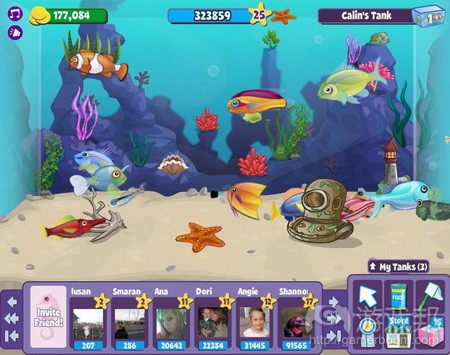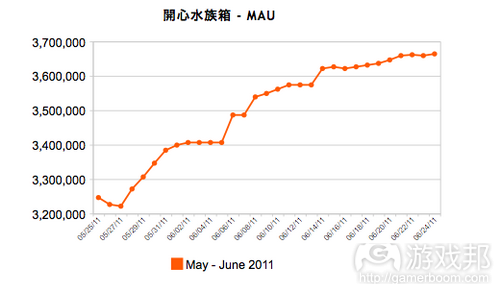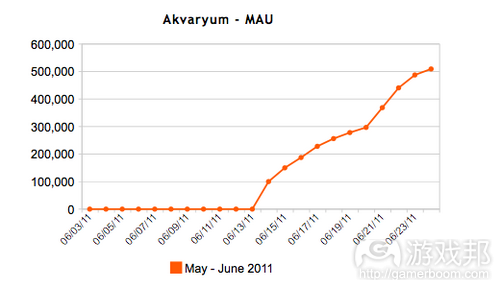Facebook水族馆游戏瞄准国际市场谋发展
作者:AJ Glasser
水族馆模拟游戏是另一传统Facebook游戏类型。虽然游戏处于“过往”状态,开发商似乎开始瞄准国际市场,帮助新款水族馆游戏获取流量。
水族馆游戏和宠物模拟类型相似,但宠物类型仅限鱼类。玩家的任务是利用食物、清除空间残骸吸引鱼类到虚拟空间,通过装饰空间吸引不同鱼类。这类游戏瞄准异步Facebook用户,因为游戏不像农场或餐厅模拟游戏那样需要大量时间管理工作,虚拟水族馆的氛围更令人身心放松,就像微软视窗的经典屏保壁纸。
顶级水族馆游戏:唯中国保持发展态势
许多热门(根据MAU)水族馆游戏(游戏邦注:如CrowdStar的《Happy Aquarium》、快乐元素的中文版《开心水族箱》、Zynga的《FishVille》和TallTree Games的《Fish World》)在Facebook平台伫立已久,可以追溯到2009年秋冬。这些游戏2010年上半年开始崭露头角,那时Facebook游戏平台开始提供广泛病毒式传播渠道,游戏因此能够从中吸引新玩家。例如,《Happy Aquarium》和《FishVille》各自的MAU和DAU在头3个月一度都突破2500万和700万,完全不同今日。
在头3个月强劲增长势头之后,每款顶级水族馆游戏的发展都有所放缓,呈平缓下滑。出现滑坡趋势恰逢Facebook限制病毒式传播渠道(游戏邦注:2010年春天)。虽然有人会因此认为水族馆游戏的下滑和病毒式传播渠道的限制有关,但我们很难下此结论,因为下滑趋势在2010年春夏呈缓慢态势,并没有出现急剧下降。此外,许多社交游戏增长3-4个月后都会出现下坡阶段,因为玩家已无新内容可以体验,纷纷开始转投其他游戏。即便如此,不难想象一旦病毒式传播渠道受限,开发商要游戏重现发展势头就得面临艰难斗争。
这里的例外是中文版《开心水族箱》,游戏从今年4月初开始就长期保持上升趋势,其MAU在过去2个月增长33%。出现该趋势的原因尚不清楚;其他国际版《开心水族箱》并未呈现同样良好发展态势。
中间水族馆游戏:唯中东和北非保持发展态势
在中间水族馆游戏中,我们发现原版《开心水族箱》也陷入下坡趋势,但其中也有新秀名单。《Akvaryum》是Peak Games(游戏邦注:这是中东和北非成功开发公司,然而该地区的其他公司却举步维艰)推出的土耳其语水族馆游戏。游戏发行前两周就已位列所有鱼类游戏第五,其MAU和DAU分别突破50万和10万。
同样在中间范围游戏的游戏是Gaia Online的《Ocean Party》,这是款融入有趣历史的传统水族馆游戏。这是该开发商的首款Facebook游戏,Gaia Online在其成功虚拟世界创造此类似游戏体验。基于其《Ocean Party》开发经验,Gaia Online随后陆续开发怪物收集和战斗游戏《Monster Galaxy》,游戏堪称Facebook成功典范。《Ocean Party》过去9个月活跃度不高,但今年6月初其MAU和DAU的小高峰预示这款沉寂的游戏将出现转机。
底层水族馆游戏:大池里的小鱼
底层水族馆游戏的语言版本比《开心水族箱》丰富,其中很多是衰退的翻版《开心水族箱》(游戏邦注:很多作品其实并不属于水族馆类型)。前10名中的《开心鱼塘》 (Happy Fish Ponds)和《Fish Isle》符合水族馆类型,但就像前两个层次的同类作品,游戏近来增势并不明显。
总结
虽然中文版《开心水族箱》和《Akvaryum》迅速风靡表明水族馆游戏在国际市场仍旧有用户群,这些游戏在Facebook上大多表现并不乐观。但我们不认为这会阻止开发商尝试新的水族馆游戏。手机游戏开发商Jirbo已成功将其iOS水族馆游戏《Tap Reef》移至Facebook平台;其他诸如HitGrab的开发商已从演变“收集小鱼”型水族馆游戏当中获得成功,该公司同时还在《FishHunt》之类的游戏中融入真实钓鱼运动。(本文为游戏邦/gamerboom.com编译,如需转载请联系:游戏邦)
Aquarium Games Fishing for Traffic in International Waters
By AJ Glasser
Aquarium simulation games are another old hat genre for the Facebook game platform, much like the restaurant simulation genre we examined earlier this week. Even with its “been there, done that” status, however, developers seem to be finding traffic for new aquarium games in the international market.
Aquarium games are like pet simulations, but confined to the pet type of fish. Players are usually tasked with attracting fish to a virtual space by using food, cleaning up debris generated in the space, and by decorating the space to make it more alluring to different types of fish. This type of game lends itself to the asynchronous Facebook audience as it doesn’t require quite as much time-management as a farm or restaurant simulation and the ambiance of a virtual aquarium is more soothing, much like the classic screen savers from Microsoft Windows.
Top Tier: Declining Everywhere But China
The largest aquarium games by monthly active users — CrowdStar’s Happy Aquarium, Happy Elements Ltd’s Chinese language version of My Fishbowl, Zynga’s FishVille, and TallTree Games’ Fish World — all have long histories on Facbeook dating back to fall and winter of 2009. These games found success throughout the first half of 2010, in the days when the Facebook games platform still offered extensive viral channels through which games could attract new users. As an example, Happy Aquarium and FishVille at one point each boasted more than 25 million MAU and 7 million daily active users during their first three months in contrast to their present-day levels.
After the first three months of growth, each of our top tier aquarium games slowed in growth, creating a gradual downward slope. The beginnings of these slopes happen to coincide with the period of time in which Facebook clamped down on viral channels available to developers — spring 2010. While one could argue that the loss of growth in our aquarium games could be connected to the loss of the viral channels, we’re can’t necessarily reach that conclusion as the downward slopes remained gradual throughout spring and summer of 2010 as opposed to showing a sharp drop-off. Moreover, most social games in any genre see growth in three to four months followed by a period of decline as players simply run out of things to do in-game and move on to other titles. Even so, it’s not hard to imagine that once the viral channels were restricted, each developer faced an uphill battle to bring growth back to the games.
The exception here is the Chinese language version of My Fishbowl, which appears to be on a long-term upward trend begun in early April of this year, up 33% in MAU over the last two months. The reasons for this trend are not immediately clear; other international versions of My Fishbowl aren’t performing nearly as well.
Mid Tier: Declining Everywhere but MENA
In the mid tier of aquarium games, we see the original My Fishbowl still stuck in a decline slope, but we also see a notable newcomer. Akvaryum is a Turkish-language aquarium sim from Peak Games, a developer that’s seen success in the Middle Eastern and North African (MENA) region where other developers tend to struggle. The game launched only in the last two weeks and is already number five out of all fish games with over 500,000 MAU and 100,000 DAU.
Also in this tier is Gaia Online’s Ocean Party, an older aquarium game with an interesting history. It was the developer’s first Facebook game built off of a similar activity in its successful virtual world, Gaia Online. Based on its experiences with Ocean Party, Gaia Online went on to create monster collection and combat game, Monster Galaxy, which is shaping up to be a Facebook success story. Ocean Party hadn’t seen much activity in the last nine months, but a small spike in MAU and DAU in early June hints at signs of life in the otherwise dead-in-the-water game.
Lower Tier: Small Fish in Big Ponds
At the bottom of our aquarium spectrum are more language variations of My Fishbowl, several decaying clones of Happy Aquarium, and a slew of games that don’t exactly fit the aquarium genre. The two that make our top 10 — 開心魚塘 (Happy Fish Ponds) and Fish Isle — do actually fit the genre, but like their siblings in tiers one and two, they haven’t seen significant growth of late.
Conclusions
While the Chinese language version of My Fishbowl and Akvaryum’s sudden popularity suggest that there is still an audience for the aquarium genre in the international market, most of these games tell a sad story for aquariums on Facebook. We don’t think it’s going to completely discourage developers from attempting new aquarium games, however. Already we see mobile developer Jirbo actively try to port its successful iOS aquarium sim, Tap Reef, to Facebook; and other developers like HitGrab are seeing success with variations on the “collect fish” theme of aquarium games as applied to the actual sport of fishing in games like FishHunt.
All data in this analysis was compiled with our social game traffic tracking service, AppData. If you believe a game has been left off this list in error, please reach out to us in the comments. (Source:insidesocialgames)











































 闽公网安备35020302001549号
闽公网安备35020302001549号